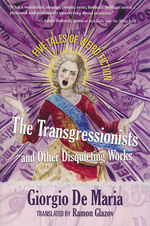
Transgressionists and Other Disquieting Works, The: Five Tales of Weird Fiction (TPB) (De Maria, Giorgio)
Before an untimely mental breakdown cut short his two-decade career, Giorgio De Maria distinguished himself as one of Italy's most unique and eccentric weird fiction masters. With a background in the post-war literary culture of Turin -- Italy's urbane but eerie "city of black magic" -- De Maria drew inspiration from the Turinese underbelly of occultism, secret societies and radical politics. His writing coincided with the decade of terrorist violence known to Italians as the Years of Lead; the outcome was a weird fiction suffused with panic, rage, trauma, paranoia and meditations on antisocial hubris. In 1978, he told an interviewer: "...I think that the dimension of the fantastic, as much as this may seem paradoxical, is the most fitting one to express a reality as complex as ours today." De Maria's debut novel, The Transgressionists (1968) portrays a cell of malicious telepaths who meet in the cafés and jazz clubs of 1960s Turin to plot world domination. After experiencing the worst of their power, an embittered office clerk resolves to join them and prove himself worthy to share in their villainy. He cultivates twisted mindfulness techniques to awaken his inner sociopath. He fights off predatory phantoms that seem maddeningly drawn to him. He prepares for the dangerous "Great Leap" which will make him into a fully-fledged Transgressionist. But could his megalomania strain relations with his fiancee? Will he sacrifice love in his quest for omnipotence? The other works in this volume are no less surreal and startling. The Secret Death of Joseph Dzhugashvili (1976) gives us a nightmarish fantasy Soviet Union, where a dissident poet finds himself trapped in a psychological experiment conducted by Stalin himself. In "The End of Everydayism," a group of futuristic artists begin using corpses as a medium -- with violent, unforeseen results. The antihero of "General Trebisonda" is a possibly insane commander who prepares for a war crime in an eerily deserted fortress. Available in English for the first time, this collection contains two novellas, two short stories and a dystopian teleplay, The Appeal, which the post-cyberpunk novelist Andrea Vaccaro has lauded as "worthy of the best episodes of Black Mirror." Meanwhile, an introduction by translator Ramon Glazov offers a detailed account of De Maria's background, creative context and thoroughly unusual life.
Udgivet af Talos
Giorgio De Maria
Giorgio De Maria (1924 - 2009) was an Italian musician and author.[1] He is best known for his 1977 novel The Twenty Days of Turin. He was part of the musical group Cantacronache.

